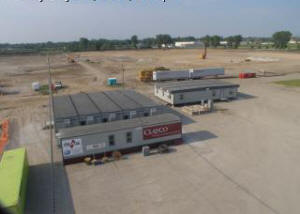Area Financial, Industrial Leaders Await New GM Initial Public Offering
|
||||||||||
| Printer Friendly Story View |

Dow Kokam plant site on Bay City Road in Midland is beginning to percolate with construction activity.

Plug-In Hybrid Electric Vehicles are a key to the future of the automotive industry, and to the economy of the Great Lakes Bay Region.
The economic picture is emerging, and brightening, for the Great Lakes Bay Region.
Financial and industrial leaders in the automotive towns of Saginaw, Bay City and Midland (yes, Midland, with the Dow Kokam battery plant under construction), are awaiting the new General Motors Corp. initial public offering (IPO) of stock.
The region has a great stake in the success of GM and the other domestic auto manufacturers and supplier firms. The IPO could firm up the financial footing of GM and contribute to local production and employment.
General Motors just released production figures for the long awaited Chevy Volt. The plug-in hybrid is the flagship vehicle for the re-branding of GM that just last year filed for Chapter 11 after slumping sales for gas guzzling SUVs and pick up trucks.
The company plans to build 10,000 Volts in 2011 and 30,000 in 2012. Initial shipments will be to dealers in California, Washington, D.C., Austin, Texas and the New York City later this year, followed by Michigan, New Jersey, and Connecticut in early 2011. The company plans to make the Volt available in all 50 states 12 to 18 months after the initial launch.
There is perhaps no better place in the nation than here to observe the falling smokestacks of the old industrial order and the rise of the new "green" technologies that will drive manufacturing into the future.
Parts for the Chevrolet Volt and other new GM products are slated to be built in local plants. Dow Kokam is the Dow Chemical Company's venture into new automotive drive technology, in partnership with South Korean and French firms.
Despite all the negative talk about the future of manufacturing, that industrial area remains a key to the local economy. Granted, it may be "greener" than before, and have fewer employees, but it is still a high value job producing area.
The Midland plant, more than three-quarters the size of the 1 million square foot Bay City GM PowerTrain plant, is reported to have from 350 employees with capacity to grow to 800 employees.
Dow Kokam was established in 2009 to develop and manufacture technologically advanced and economically viable battery solutions for the transportation, defense, industrial and medical industries. The company is owned by The Dow Chemical Company, TK Advanced Battery LLC and Groupe Industriel Marcel Dassault (Dassault).
Uniting the three companies creates the first battery and energy management systems manufacturer to combine the viable, scalable, large-format battery technology with the market franchise, manufacturing expertise and market knowledge necessary to become the clear partner of choice across industries.
Dassault, through its wholly-owned subsidiary SVE, has been working with Kokam Company Ltd. under a Joint Development Agreement since 2008 and has developed Cleanbat, a proprietary and patented battery system technology incorporating liquid-cooled thermal management and electronics.
Created in 2002 by Dassault, SVE designs, develops and markets under the Cleanova brand high performance lithium-ion battery and energy management systems for hybrid and electric vehicles.
SVE has built experience through an extensive road tests program on vehicles equipped with lithium-ion electric traction systems. The Cleanova electric power unit, developed for SVE by partner TM4, is compact and efficient.
In the hybrid electric version, a two-cylinder internal combustion engine can be coupled with the electric motor via an intelligent clutch system.
The Cleanbat battery system is a high energy Lithium-ion system based on the assembly of one or several standard 7 kWh water-cooled packs.
The Digital Vehicle Management System (DVMS) is a modular and open electronic supervisor which manages energy and all electric functions of the vehicle, including the Battery Management System. DVMS originates from Dassault's expertise in system integration.
The Cleanova "Plug and Play" approach is intended to facilitate a rapid integration in any vehicle. AUTOSAR-compliant, DVMS offers real-time supervision of sub-systems, including the Cleanbat BMS, and the vehicle other electric functions, including driving modes, on-board power, traction control and regenerative braking, dashboard displays and alerts, safety and on-board maintenance diagnosis, remote control and support.
The Obama administration has a goal of putting one million new plug-in hybrid vehicles in service by 2015.
The Midland venture's manufacturing facility represents one of the most significant and immediate moves in the creation of the expected $60 billion advanced battery industry which is poised to create tens of thousands of new jobs in the United States.
"I applaud President Obama and the Department of Energy (DOE) for helping ensure the next generation of advanced battery technology is developed and built right here in America," said Andrew N. Liveris, Dow Chairman and CEO, adding:
"This is the type of comprehensive, collaborative approach that is needed to give the U.S. a sustained leadership position in this leading-edge industry. Dow is excited to begin using our expertise in chemistry to help overcome the technical challenges of developing and commercializing the next generation of advanced automotive batteries."
The priority placed on the local venture by the government was confirmed by Vice President Joe Biden's recent presence here at the groundbreaking for the new Dow Kokam plant.
When complete, the Dow Kokam joint venture's Midland facility is expected to produce enough batteries to supply 60,000 hybrid or electric vehicles per year, create new green collar jobs and help meet the nation's employment, energy and environmental goals.
Clayco Inc., of St. Louis, Missouri, is the design-build contractor overseeing construction of its battery manufacturing facility in Midland. Clayco is responsible for the design and construction of the facility, which will produce lithium ion battery cells and packs for hybrid and electric vehicles.
"Dow Kokam's speed to market is critical to meeting the automotive industry's needs for a competitive energy source for the transportation industry," said David Pankratz, Dow Kokam's vice president of operations, adding:
"Our highly automated and environment controlled manufacturing processes required that Dow Kokam select a general contractor with a superior track record, related experience and a shared passion for moving safely and quickly toward building this industry in the US. Clayco was the clear choice."
Construction of the new 800,000 square foot, large-format battery manufacturing facility will take place in two overlapping phases. The first phase of construction, which began in May 2010, is supported by a Department of Energy Reinvestment and Recovery Act grant. When Phase I is complete, the facility will span 400,000 square feet, have a targeted capacity of 600 million watt hours and will employ at least 320.
The Michigan Economic Growth Authority (MEGA) Board also approved a state tax credit valued at $44.6 million over 15 years and a battery cell tax credit valued at $100 million over four years for the joint venture.
GM, which declared bankruptcy last year, has emerged from Chapter 11 protection, and an IPO is a key step for the automaker to wean itself from government support.
GM is more likely to cut the valuation on the IPO than delay the deal, according to news sources. The firm reportedly is looking for a broad investor base.
First slated for mid-July, the IPO now is said to be delayed until mid-August as GM Chairman Ed Whitacre lines up more cash from banks as a backup to the stock deal.
The fear of a "double dip" recession is believed to be spooking the GM chief, so he wants to have at least $5 billion in the corporate sock just in case.
GM reportedly plans to file an IPO seeking sale of stock worth nearly $20 billion, one of the largest IPOs in history. At that figure the IPO would surpass the $19.7 IPO of Visa, Inc., in 2008.
The IPO price has variously been estimated at $15 to $85 per share.
Fox News has reported that selection of an underwriter, with $300 million in fees at stake, is being handled by officials from GM and the U.S. Treasury Department. As a result of its bailout of the automaker, the U.S. government holds a 61 percent stake in the company.
According to Reuters, GM's IPO could be one of the biggest ever in the U.S., raising as much as $20 billion and reviving consumer confidence in the company and its brands.
Reuters sources note that the GM's offering will probably result in a minority stake in GM for the U.S. government while allowing the company to raise new funds.
Currently, the Treasury has a 60.8 percent stake in GM stock after bailing out the automaker with $50 billion last year. Reuters reports that the Treasury wants to sell roughly 20 percent of this stake in the sale.
Banks involved in talks for a revolving credit line worth $5 billion include Bank of America Corp., Citigroup Inc., JPMorgan Chase & Co., and Morgan Stanley. Those banks have already agreed to provide $500 million of credit each, with other banks yet to be chosen, a source said.
The governments of Canada and Ontario, which own 11.7 percent of the company, are planning to sell 20 percent of their stake, a source said.
The United Auto Workers health care trust holds 17.5 percent of the company and the old GM, now known as Motors Liquidation, holds 10 percent. It is unclear if it will sell shares in the IPO, sources said.
A successful IPO would be an important political win for the Obama administration, which engineered bailouts for both GM and its smaller rival Chrysler in 2009 in the face of Republican criticism and public opposition.
###
| Printer Friendly Story View |
|
|

Dave Rogers |
|
|
|
Printer-Friendly Story View
0200 Nd: 04-14-2024 d 4 cpr 0
12/31/2020 P3v3-0200-Ad.cfm
SPONSORED LINKS
12/31/2020 drop ads P3v3-0200-Ad.cfm


